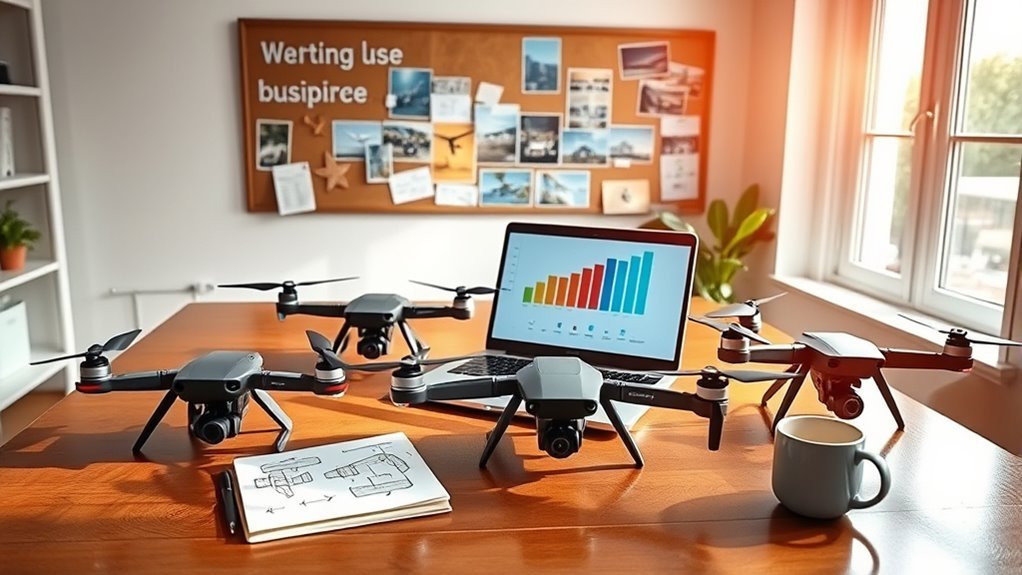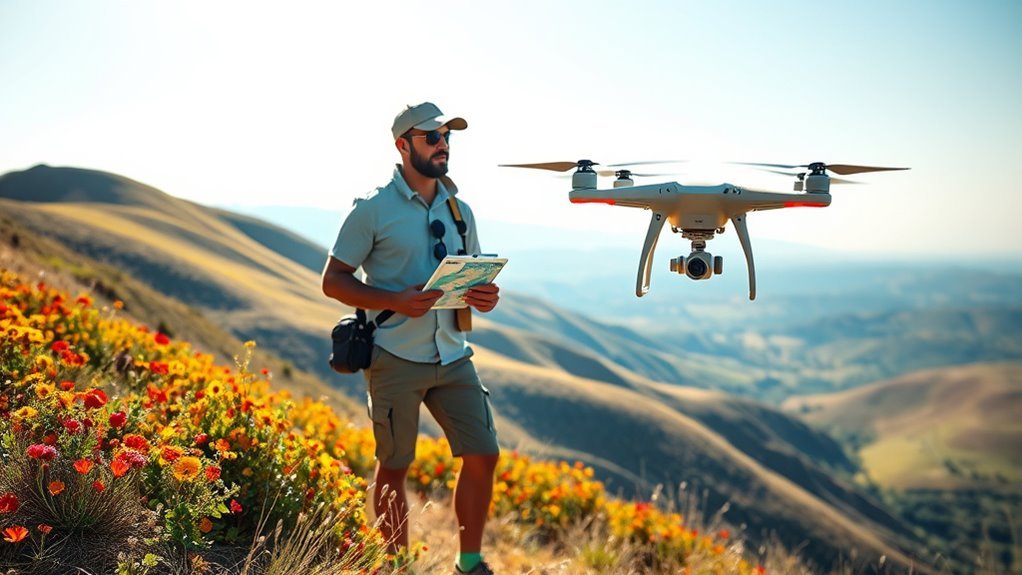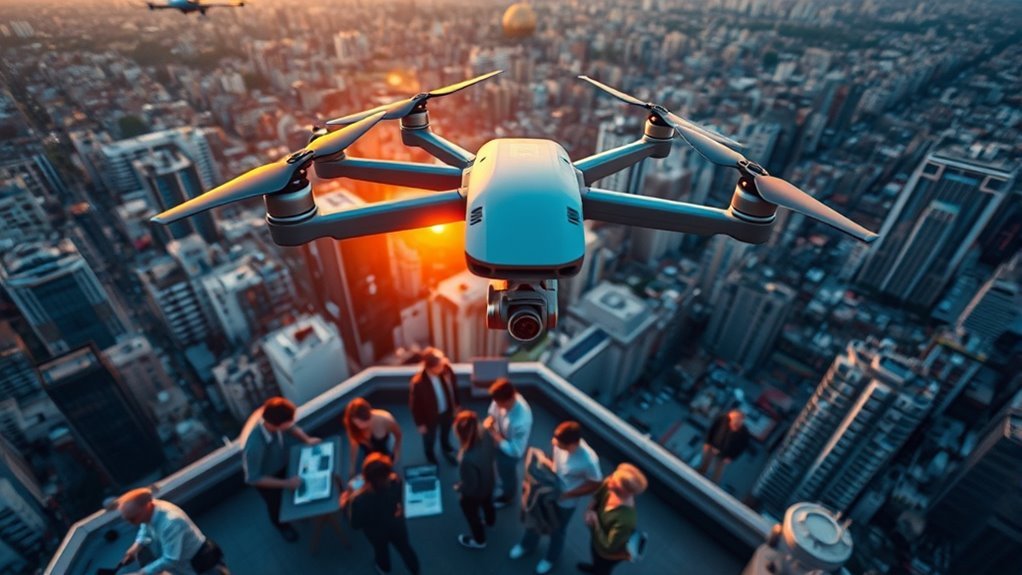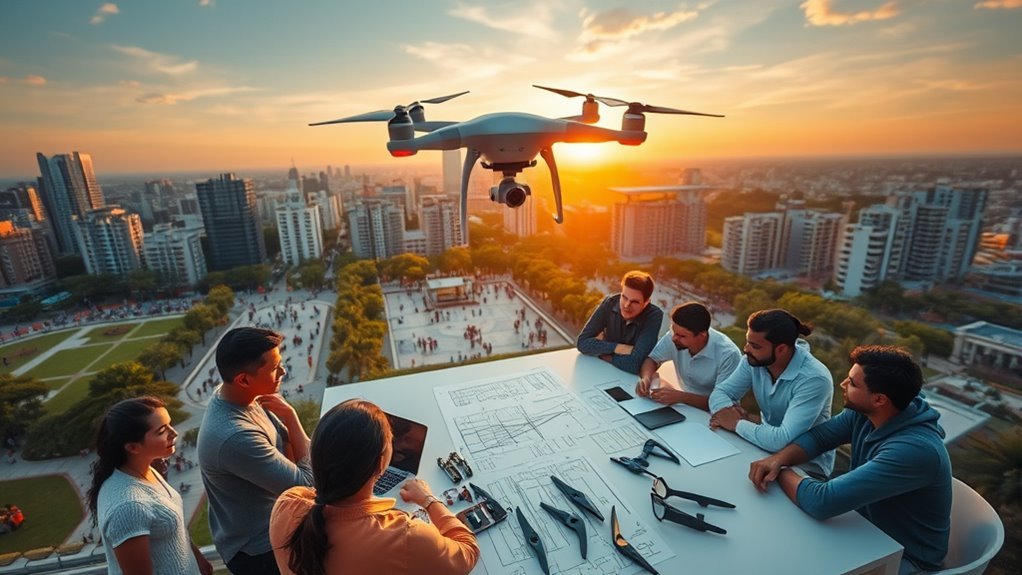To start a successful drone business, you need to grasp the evolving industry landscape, pinpoint your niche, and navigate legal requirements. Choosing the right equipment is essential, along with developing a robust business plan and effective marketing strategies. As you scale your operations, focus on metrics that drive growth and customer engagement. By understanding these elements and staying adaptable, you can position your business for success in this competitive market. Explore further to reveal more insights.
Understanding the Drone Industry Landscape

As you immerse yourself in the drone industry, it’s essential to recognize that this rapidly evolving sector is shaped by various factors, from technological advancements to regulatory changes. Understanding drone technology trends is vital; innovations like AI integration and improved battery life are redefining capabilities. For instance, the extended flight time provided by advanced battery optimization techniques allows for longer operations, making drones more versatile in various applications. Conducting an industry competition analysis will help you identify key players and their strategies, enabling you to carve out your unique space. Keep an eye on market demands and emerging applications, as sectors like agriculture and delivery continue to expand. By staying informed and adaptable, you can position your business to thrive amidst competition while leveraging the freedom that this dynamic landscape offers. Embrace the opportunities and challenges that come with steering through the drone industry. Additionally, the rise of AI-driven autonomous navigation will play a crucial role in ensuring safer flight experiences for consumers.
Identifying Your Niche in the Drone Market

Maneuvering the drone industry requires not just awareness of its vast landscape but also a clear understanding of where your business can fit within it. Start by exploring specific niches like drone photography for events or agricultural monitoring for farmers. Aerial surveying can be lucrative in construction, while search and rescue missions offer both purpose and profit. If you’re into adrenaline, consider drone racing as a competitive edge. Infrastructure inspection is crucial for safety, and wildlife conservation efforts are increasingly using drones for tracking. Assess your interests and skills to determine where you can excel. Identifying your niche will not only set you apart but also align your passion with market demand, giving you the freedom to thrive. Additionally, consider focusing on advanced crop monitoring to tap into the growing agricultural technology sector. Utilizing real-time data analytics can significantly enhance your precision farming services, ensuring efficient resource allocation and sustainable practices.
Legal Requirements and Regulations for Drone Operations

Understanding the legal requirements and regulations for drone operations is essential for your business’s success. You need to navigate the licensing and certification process, be aware of airspace restrictions, and secure appropriate insurance and liability coverage. By addressing these key areas, you can guarantee compliance and mitigate risks associated with your drone operations. Furthermore, it is crucial to ensure that your drone is properly registered with the FAA to avoid potential fines and legal repercussions. Additionally, you must be aware of state and local laws that can impose additional restrictions on drone flights, particularly over private property.
Licensing and Certification Process
Before launching your drone business, it’s important to navigate the complex landscape of licensing and certification requirements that govern drone operations. Understanding the specific licensing requirements in your jurisdiction is vital, as they can vary considerably. You’ll likely need to complete a certification program to legally operate commercially, ensuring you’re equipped with the necessary skills and knowledge. These programs often cover regulations, safety protocols, and flight operations, preparing you for real-world challenges. Additionally, staying updated on any changes in legislation or new certification options can provide you a competitive edge. By strategically managing these requirements, you’ll not only comply with the law but also enhance your credibility and appeal to potential clients, allowing you the freedom to grow your business effectively.
Airspace Restrictions and Zones
While you may be enthusiastic to take to the skies with your drone business, guiding through airspace restrictions and designated zones is vital for legal compliance and operational success. Understanding airspace classification is significant; it dictates where you can and can’t fly. Familiarize yourself with controlled airspaces, which often require permission to operate, and the various no fly zones, such as near airports or government buildings. Utilizing apps and resources to check real-time airspace status can save you from hefty fines and operational setbacks. By maneuvering these regulations effectively, you not only safeguard your business but also enhance your reputation as a responsible operator. Prioritize these legal requirements to fully harness the freedom your drone offers.
Insurance and Liability Coverage
Insurance is an essential component of establishing a successful drone business, as it protects you from potential legal and financial repercussions. Understanding the insurance requirements specific to drone operations is important for safeguarding your investment. First, consider liability coverage, which shields you against claims resulting from accidents or damages caused by your drone. Depending on your operations, you may also need additional coverage, like commercial drone insurance, to meet industry standards. Familiarizing yourself with local regulations is critical, as they dictate the minimum insurance requirements for drone operators. By prioritizing insurance and liability coverage, you not only comply with legal obligations but also enhance your credibility, allowing you to operate your drone business with confidence and freedom.
Choosing the Right Equipment and Technology
Choosing the right equipment and technology is essential for your drone business’s success, especially since the market is flooded with options that cater to various needs. Start by researching popular drone brands known for reliability and performance; some of the leading names include DJI, Parrot, and Autel Robotics. Focus on equipment features that align with your specific services, such as camera quality for aerial photography or flight time for surveying. Evaluating battery life and power management alongside your budget and the technology you need ensures you invest wisely. Remember, the right combination of versatility, durability, and advanced tech will set you apart from competitors. Ultimately, the equipment you choose will empower your business to achieve its goals and provide the freedom to explore new opportunities. For instance, consider a drone with high-quality camera capabilities to capture stunning visuals that meet professional standards.
Developing a Business Plan for Your Drone Venture
Creating a solid business plan is vital for your drone venture, and it starts with a thorough market analysis. You’ll need to understand your target audience, competitors, and industry trends to position your services effectively. Additionally, outlining financial projections will help you gauge profitability and secure potential investors. Incorporating insights from advanced AI integration can enhance your service offerings and improve customer satisfaction. Furthermore, leveraging real-time monitoring capabilities can provide your drone business with a competitive edge by ensuring timely responses to operational challenges.
Market Analysis Overview
When starting a drone business, understanding the market landscape is essential for crafting a successful business plan. You need to identify your target audience and analyze their specific customer needs to tailor your services effectively. Conducting a competitive analysis will reveal market trends and potential pricing strategies that align with current service demand. Stay aware of industry challenges, such as regulatory hurdles and technological advancements, which could impact your operations. Additionally, recognizing growth opportunities—like expanding into niche markets or offering complementary services—can set you apart. By focusing on these elements, you’ll create a robust business plan that positions your drone venture for success in a dynamic, ever-evolving landscape.
Financial Projections Outline
Establishing clear financial projections is essential for any drone venture, as it serves as the backbone of your business plan. To craft effective projections, utilize financial forecasting techniques that analyze market trends and your operational costs. Start by estimating your initial startup expenses, including equipment, licenses, and marketing efforts. Next, develop revenue forecasts based on service pricing and potential clientele.
Incorporate budget management strategies to guarantee you’re allocating your resources wisely. Regularly review and adjust your financial projections to reflect any changes in the market or your business model. This proactive approach not only prepares you for challenges but also empowers you to seize opportunities, paving the way for a thriving, autonomous drone business.
Marketing Your Drone Services Effectively
To successfully market your drone services, it’s essential to understand your target audience and tailor your strategies accordingly. Effective marketing hinges on well-crafted social media strategies that enhance client engagement and showcase your unique offerings. Here are some key tactics to contemplate:
- Create visually appealing content that highlights your drone capabilities.
- Utilize platforms like Instagram and LinkedIn to connect with potential clients.
- Engage with your audience through polls, Q&A sessions, and live demonstrations.
- Leverage testimonials and case studies to build trust and credibility.
As you promote your services, consider emphasizing your drone’s superior flight range, which can enhance your appeal to clients looking for reliability in aerial photography. Additionally, showcasing your drone’s advanced obstacle avoidance features can further demonstrate its capabilities and safety, attracting clients who prioritize safety in their aerial operations.
Scaling Your Drone Business for Growth
Scaling your drone business for growth requires a strategic mindset that focuses on efficiency and adaptability. To achieve this, you’ll need to implement effective scaling strategies that align with your long-term vision. Start by identifying key growth metrics, such as customer acquisition cost and lifetime value, to measure success accurately. Streamlining operations through automation and investing in advanced technology can enhance your service offerings, making you more competitive. Additionally, consider diversifying your services to tap into new markets, which can open additional revenue streams. Regularly assess your performance to pivot quickly in response to market changes, ensuring that your business not only grows but thrives in the evolving drone industry. Emerging brands in the drone market are leveraging AI and advanced sensors to create versatile options, enhancing your competitive edge. Chinese drone brands are redefining industry standards with their innovative designs, which can further benefit your growth strategy. Freedom in entrepreneurship often comes from smart, scalable decisions.
Frequently Asked Questions
What Are the Startup Costs for a Drone Business?
Starting a drone business, you’ll face startup costs like equipment, licenses, and insurance. Keep an eye on market trends and invest in the latest drone technology; it’s essential for staying competitive and maximizing your potential.
How Can I Find Clients for My Drone Services?
To find clients for your drone services, leverage social media platforms to showcase your work and engage potential clients. Attend networking events to build relationships and establish credibility in the industry, enhancing your visibility and opportunities.
What Insurance Do I Need for My Drone Business?
For your drone business, you’ll need liability coverage to protect against potential claims. Familiarize yourself with drone regulations, as compliance influences your insurance needs. Choosing the right policy guarantees you operate confidently and freely in the industry.
How Do I Handle Drone Maintenance and Repairs?
Think of your drone as a bird in flight; it needs regular inspections and careful repair techniques to soar high. Prioritize maintenance schedules, document repairs, and stay informed about advancements to guarantee its longevity and reliability.
Can I Hire Subcontractors for My Drone Operations?
Yes, you can hire subcontractors for your drone operations. Ascertain they meet necessary qualifications and align with your project management strategies. This approach can enhance efficiency and give you the freedom to focus on growth.

